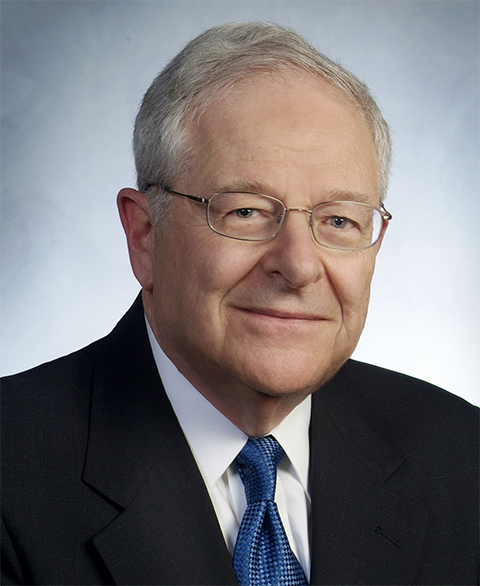Retiring a research lab
Research labs are typically helmed by a primary investigator who metaphorically steers the ship. But what happens when a researcher retires? Does the science carry on?
To better understand the outcomes of PI retirement, I talked with Art Spector. Spector retired as an emeritus professor of biochemistry at the University of Iowa Carver College of Medicine in 2007, after 39 years on the faculty. He explained his retirement process, including what happened to his lab.

Thinking about retirement
Spector said to start planning retirement early — maybe earlier than you’d think.
“Begin to consider retirement far in advance so you have sufficient time to come up with a well-thought-out plan and do not have to make snap decisions at the end,” he said.
His university recommended researchers begin interacting with the human resources department at least five years before a possible retirement date, and Spector found these interactions helped him plan. Informing appropriate administrators such as department heads and deans can give them sufficient time to formulate plans for your position, lab space, and other resources.
Beyond the administrative tasks associated with retirement, Spector said the most important thing to consider is the laboratory personnel. He advises against taking on any new students or trainees if you might retire before they have a chance to complete their studies.
“If there are students or trainees who have not finished, (you) should take an active role in helping them find suitable places to continue their work,” Spector said. “The investigator should provide whatever assistance may be needed.”
Stopping research — or not
If you’re thinking about retiring, you’re probably also thinking about when and how to shut down your lab. Spector recommends submitting your final research papers before closing your lab so you can finish any additional experiments requested during review.
“Many investigators wait to write up their final studies until after retirement, and this may work out well for some,” Spector said. “However, it can be frustrating to have a paper rejected by the journal of choice because of reviewers’ concerns that could be easily overcome if the laboratory facilities, personnel and reagents were still available.”
Beyond reviewer-requested experiments, do researchers actually keep doing research after they retire? That answer seems to be personal — some continue at the bench in a limited capacity, while others happily say goodbye to the lab life.
Spector did not stop completely. “I kept my laboratory open for one year to finish an ongoing project with the help of a long-time research assistant and several faculty collaborators,” he said.
It’s unlikely that every research project will be perfectly aligned to end at the same time, so it’s not uncommon for newly retired researchers to tie up loose ends. In general, though, most research projects wrap up soon after an investigator retires.
“A project is the creative work and reflects the personal interests of the investigator,” Spector said. “No one can fully take it over.”
What’s next?
What comes after retirement varies by person. If an investigator wants to stay involved in their research field, Spector said, there are myriad ways to do so without running a lab.
“Remember that your scientific expertise does not suddenly disappear when you retire,” he said. “The key is to seek opportunities and not wait for them to fall into your lap.”
If you want to stay research-adjacent, Spector recommends offering to review papers or grant applications, or writing review articles. You might be able to work part-time with a laboratory to help mentor students and help develop new research directions.
Spector himself became a special volunteer at the National Institutes of Health after moving to Maryland. In this role, he advises staff scientists and trainees on the lipid aspects of their work, his area of expertise.
“While I do not have my own project,” he said, “this affiliation has enabled me to remain at least partially active in my research field without the pressures of running my own laboratory.”
Enjoy reading ASBMB Today?
Become a member to receive the print edition four times a year and the digital edition monthly.
Learn moreFeatured jobs
from the ASBMB career center
Get the latest from ASBMB Today
Enter your email address, and we’ll send you a weekly email with recent articles, interviews and more.
Latest in Careers
Careers highlights or most popular articles

Redefining lipid biology from droplets to ferroptosis
James Olzmann will receive the ASBMB Avanti Award in Lipids at the ASBMB Annual Meeting, March 7–10, just outside of Washington, D.C.

Creating change in biochemistry education
Pamela Mertz will receive the ASBMB William C. Rose Award for Exemplary Contributions to Education at the ASBMB Annual Meeting, March 7-10 in Washington, D.C.

Trainee mentorship as immortality
Suzanne Barbour will receive the ASBMB Sustained Leadership Award at the ASBMB Annual Meeting, March 7-10 in Washington, D.C.

Upcoming opportunities
Join us Feb. 5! The monthly ASBMB Transcription Webinars aim to facilitate knowledge exchange and collaboration among researchers in the fields of transcription, chromatin and epigenetics.

Life in four dimensions: When biology outpaces the brain
Nobel laureate Eric Betzig will discuss his research on information transfer in biology from proteins to organisms at the 2026 ASBMB Annual Meeting.

Redefining excellence to drive equity and innovation
Donita Brady will receive the ASBMB Ruth Kirschstein Award for Maximizing Access in Science at the ASBMB Annual Meeting, March 7–10, just outside of Washington, D.C.

